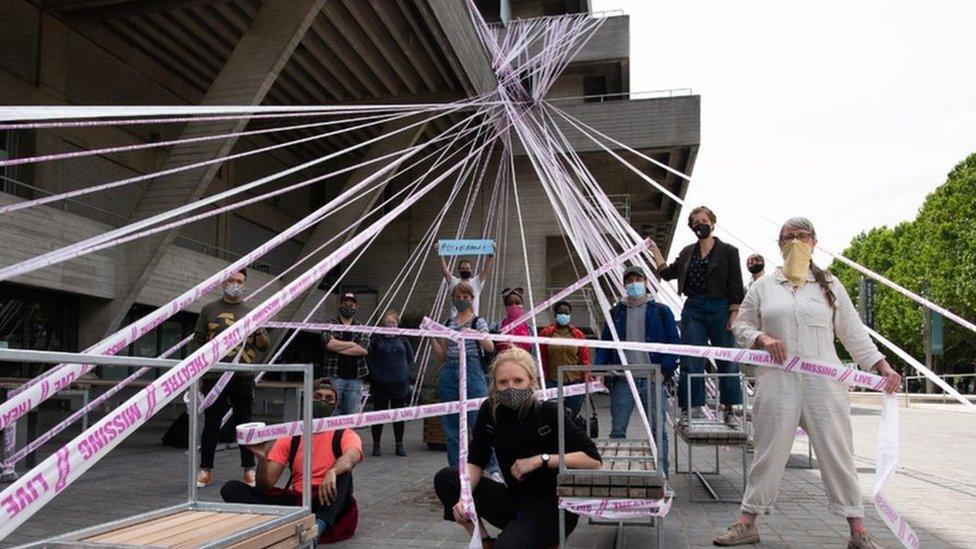A year ago, the show did not go on. What happened next?
- Published

The cast of Our Lady of Blundellsands had a run of a week before the show was cut short
Last March, Liverpool's Everyman theatre opened its new play, Our Lady of Blundellsands, starring Josie Lawrence and written by Jonathan Harvey.
After a week, it closed again.
That was when Covid-19 shut all theatres, and most have stayed dark since. But what has happened to people involved in the performing arts over the past 12 months?
Some of those who worked on Our Lady of Blundellsands give a snapshot of what has happened over the past year - from cast members, to backstage staff who ended up working in warehouses or making face masks, to an usher who became a model during lockdown.

Back home - to catch Covid
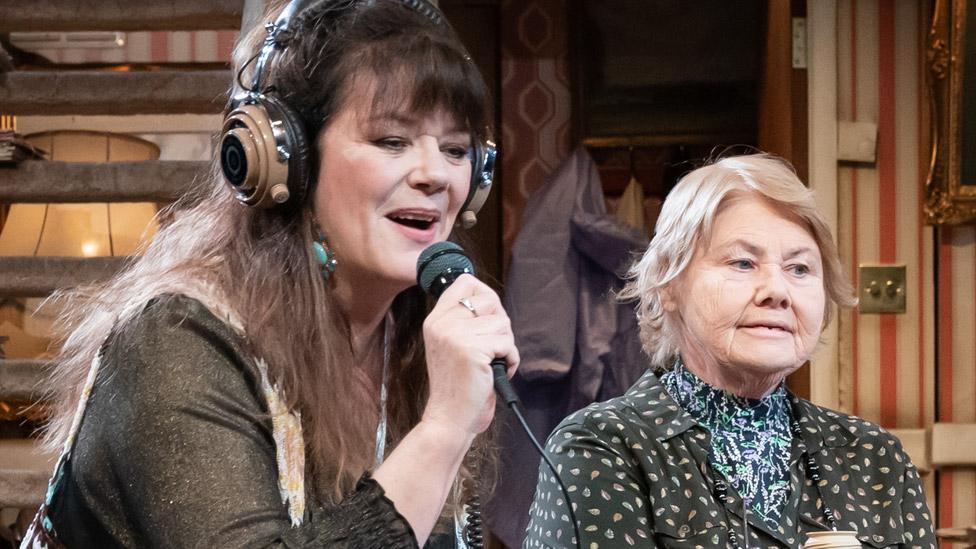
Josie Lawrence (left) and Annette Badland played sisters Sylvie and Garnet
Josie Lawrence, actress
"At least we had a chance to perform it, to bring it to life," says Lawrence, who starred as lead character Sylvie in the family comic drama. When the cast and crew got together one last time to say goodbye on the set, "it was really moving actually", Lawrence recalls, "because we'd worked hard on it".
Returning home early, two friends were still housesitting. When one came down with Covid, Lawrence followed. "That's how my lockdown began, with us feeling very flu-y and breathless and fatigued."
After recovering, she kept busy by doing things like writing a short film and appearing in a live online play, The Boss Of It All, from her office. "There were costume changes next to me," she says. "The only thing I did worry about was that I couldn't shut my office door because my broadband would act up if I did. So people wouldn't know it, but I'd occasionally either have a cat on my lap or chewing the wires."
She moved to the kitchen to represent Denmark with a song called Bink Bonk Bink in a spoof Eurovision Song Contest. "It was fun to do! It passed the time."
But the appearances she has made at The Comedy Store most weeks for the past 35 years were reduced to a few visits to the London venue for online performances, which were "kind of wonderful and sad all at the same time". She now misses performing in front of a real audience "more than anything".
"There will be a time when things will open up again," she says. "And I think people will be ravenous for a bit of art and a bit of theatre."

'The king of poor life choices'
Phil Buckley, production manager
After getting Our Lady of Blundellsands up and running, Buckley had planned to leave his staff job at the Everyman to go back to a freelance life. "I was the king of poor life choices at that moment," he says ruefully.
He left the company after press night. A week later, theatres went dark. "For a few weeks I was in that bracket where I wasn't eligible for anything," he says of the government support. However, when companies were allowed to re-hire employees who had recently left and put them on furlough, the Everyman did just that. "They didn't have to do that at all, so I'm eternally grateful to them for it. But once they had to make the contributions [in August], they had to think of it on a business sense of trying to save the organisation."
Buckley sought other jobs. "I worked in a Hermes warehouse for a little bit. For a couple of months I was a groundsman, cutting grass, trimming hedges and so on."
He then became a technical assistant for an online show at Manchester's Contact Theatre, which has since kept him on for five months to help with the venue's refurbishment. "It's just casual technician work, but it's work, and in theatre, so I'm massively lucky."
He adds: "I've been very grateful for what I have had, because I know so many friends who are without work. They're doing what I was doing at the beginning. A lot have become care workers - that's massively been a thing that theatre people have done."
Buckley's partner has also continued working. "So I feel quite fortunate to be healthy and I'm not worried that I'm going to lose my house suddenly," he says.

A 15-year career - what now?

Gemma Dunne, stage manager
As stage manager, Dunne co-ordinated props, scripts and anything else needed for the smooth running of the rehearsals and the show. Before the pandemic, she worked continuously as a freelancer in the north-west as well as for the National Theatre and the Royal Shakespeare Company.
She got the government's self-employment grants, but with "high anxiety" about her income as the single parent of a 16-year-old, she has applied for 30 jobs in more stable places like universities and hospitals. "I got a couple of interviews, but wasn't successful," she says.
If she did get another job, she wonders whether she and others like her would be able to go back to the theatre. "It's taken me 15 years to get to here now," she says. "As a working class person, it was hard. Am I going to have to go through that again? If those conversations don't happen, then you're just going to have people who are able to afford to work in the arts, and we've just destroyed the past 20 years of diversity."
The pandemic has brought members of the industry together, however, and Dunne helped set up campaign group March for the Arts last year to speak up for their rights and for the arts. It has been "a very hard year personally", though, with bereavements and being cut off from her extended family, she says.
"Having to process all of that, which for me in itself is huge, along with the career you've worked 15 years for and at times missed parents evenings for, or missed a birthday of my daughter for... It feels a year of loss. Of great loss. Of deep rooted loss.
"And within it, amazing pea shoots of positivity with March for the Arts. And also, you know, getting to make my daughter cheese and ham sandwiches at lunchtime because I've arranged for both of us to have a break then, and be able to have that time [with her] because I don't have to rush off to work."

From admin to 'fighting for survival'
Brendan Douglas, box office manager
While work stopped abruptly for some, others had the daunting task of getting in touch with ticket holders for future performances, and processing refunds and donations.
"We had thousands and thousands of emails per month, we had a lot of shows to get through," says Douglas. That was all against a backdrop of concern about the venue's future.
"Those days when we were at home, processing those donations and refunds and credits, it felt like we were almost fighting for survival. And so it felt like very important work," he says.
"It didn't feel like laborious admin, it felt like we do something really important. We were getting money back to people who desperately needed it back, and we were accepting the donations from people who were able to do that. We wanted to utilise that support to keep us afloat. But there was a sense of anxiety there as well, just in our personal lives."
Once the box office work subsided, Douglas had 10 weeks on furlough. One silver lining was that he was able to finish his self-published young adult novel earlier than planned.
The Summoner and the Dark, a fantasy set in a world of constant night-time, was published last autumn. The theatre even plugged that and other staff members' creative sidelines in its monthly email newsletter. "A lot of people have side hustles, so they were really good at putting that word out," Douglas says.

'I signed a modelling contract in lockdown'
Allow Instagram content?
This article contains content provided by Instagram. We ask for your permission before anything is loaded, as they may be using cookies and other technologies. You may want to read Meta’s Instagram cookie policy, external and privacy policy, external before accepting. To view this content choose ‘accept and continue’.
Mo Alnour, usher
Alnour, who arrived in Liverpool from Sudan as a refugee in 2017, was enjoying working at the Everyman until it shut. "The people are all friendly, very welcoming," he says.
While furloughed, he did security training, meaning he was able to come back as a door supervisor when sister theatre the Liverpool Playhouse briefly reopened before Christmas. "It was really, really good to go back to the theatre just for a short time, and see the audience and help them," he says.
He says the past year has been "quite difficult" - but the security certificate wasn't the only string he added to his bow during lockdown. "I applied for modelling, and then I was accepted," the 27-year-old says. "So now I'm a model."
Alnour now has an agent, external and is building up a portfolio in the hope of being in the spotlight himself soon. So far, he's only been able to do one modelling job, for a clothes company. "It's been affected by the pandemic, as everything has been. So hopefully when the restrictions are over, there will be more opportunities."

Making face masks for charity

The Our Lady of Blundellsands company during a read-through
Sarah Lewis, company manager
When the show couldn't go on, Lewis helped the cast and creative team gather their things and get home. After that, she tried to get information to help the theatre's freelancers. "I spent a lot of time kind of going to webinars and trying to find out as much as I could to see if I could help," she says.
She worked for a further four weeks. "I was just tying up the shows and feeling a bit overwhelmed myself and wondering what all these lovely, hardworking people were going to do."
After going on furlough, she turned her hand to making face masks, raising more than £800 for food bank charity the Trussell Trust, and also dabbled in furniture upholstery. "I was doing that before, mostly for the shows, but I decided to try a few things out and made a little page for it, and did it a bit more for myself, which was nice."
That was also with a view to needing a possible plan B in her career. "That was definitely in my mind. It's something I like to do for a hobby anyway. But yeah, it was definitely like, maybe this should be something I should try out. It is something that plays on your mind for the future and still does to an extent, even though everyone's been so great at work."
Lewis also returned to work for the Playhouse's Christmas show, which turned out to be "really emotional", she says. "I think everyone went through a little round of being quite overwhelmed by how much they've missed it, and how nice it was to be back."

Fight training moved online
Kev McCurdy, fight director
Teaching people how to fight is a job that not many people know exists, and one that fewer would imagine could be done at long distance.
McCurdy choreographs fight scenes between actors in plays and TV shows, and is the fight instructor at the Royal Welsh College of Music and Drama. After Our Lady of Blundellsands, his schedule was all but wiped out.
"I had a huge amount of work I lost in three days," he says. "I was just going through the diary and crossing everything out, and wondering then, where am I going to get the next pay cheque? I've still got a mortgage to pay, still got things to pay, still got a family to support. It was really, really hard."
As a freelancer, the government's self-employment grants were "a lifesaver", as was "the odd TV job" and his college work, which resumed after an initial hiatus. He figured out a way to teach students remotely by shooting and editing tutorial videos in one half of a fight for the moves required.
"I had to be very inventive," he says. "I'd be throwing myself around in the back garden with a camera set up. It worked out really well." That revelation itself brought new opportunities. "It's opened quite a few doors as to, OK, so I can teach for people in another country," he says.
"We got thrown into using a technology that a lot of us thought we'd never use, and we've had to adapt. We adapt. That's what we do. And the unity that has happened around the entertainment sector has been huge. The amount of groups that have happened to help people that are in a bad way and to give support has been absolutely brilliant."

'I should be in the West End now'

Gemma Brodrick, actress
Our Lady of Blundellsands was "my favourite show that I've ever done", says the Liverpool-born actress, who played Alyssa. "Doing a play in Liverpool that's set on Merseyside, that's a special experience anyway, because the Liverpool crowd is really raucous and really engaged. So I'm grateful that at least we did get the week that we did."
Brodrick also played Cilla Black's friend Pauline in the 2014 ITV drama Cilla, and after the Everyman had a year's work lined up reprising that role on tour and then in the West End. "That's what we would be doing right now."
Seeing that and other jobs bite the dust was "so disappointing", she says. "It's such a hard industry anyway. And then it just all gets taken away in one fell swoop. You define yourself by your job, don't you? And then when it gets taken away, it's really hard."
Instead, Brodrick has been writing scripts, doing occasional promotional work and taking part in online play readings. "I'm trying to stay creative and stay in this industry," she explains. She would normally get paid for things like play readings, but admits: "At the moment, it's a bit voluntary."
She did, however, qualify for the government's self-employment grants. "I am so fortunate, because most of my friends are in our industry, and I'd say only half of us have qualified for it, which is so tough."

Online auditions 'not the same'
Sophie Parrott, casting director
The theatre work Parrott had lined up after Our Lady of Blundellsands - casting three or four shows - "went down the pan", although a TV project did continue until she went on maternity leave in October.
So she was "in a better situation than many", she says. But she adds: "Friends of mine who are theatre casting directors, it's been absolutely catastrophic." Even when theatres do return, a specialist casting director is one thing venues may be tempted to cut back on if they have a tight budget, she explains.
"Casting is a job that people often don't realise they need until they have a casting director and then realise what difference it makes."
The closure of theatres has also made it harder for casting experts to spot new talent. "Normally we're all going to the theatre three or four times a week. And suddenly that resource is gone, and things like showcases went online."
To fill the gap, Parrott and others have been holding online feedback sessions with young actors, while most auditions have been replaced by asking hopefuls to film themselves at home. "I think it puts a lot of pressure on actors, actually, because they get none of the support you get in a casting room," she says.
While online audition tapes are "just not the same" as being in the same room, there are some advantages. "You can watch a lot more self-tapes than you can necessarily audition people in a day," says Parrott, who returns from maternity leave at the end of March. "So hopefully we can consider a wider pool of talent."

The Liverpool Everyman is hoping Our Lady of Blundellsands can resume this September.
- Published2 March 2021
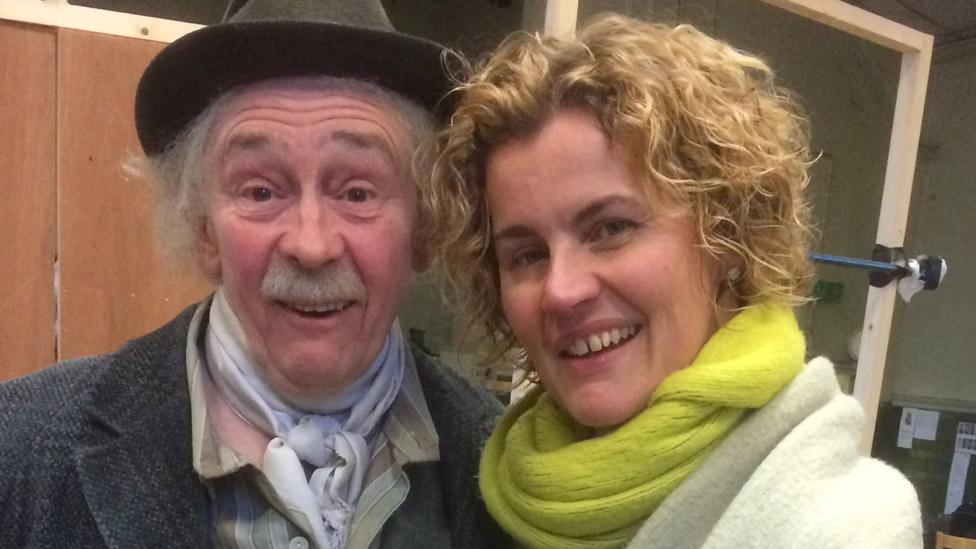
- Published26 January 2021
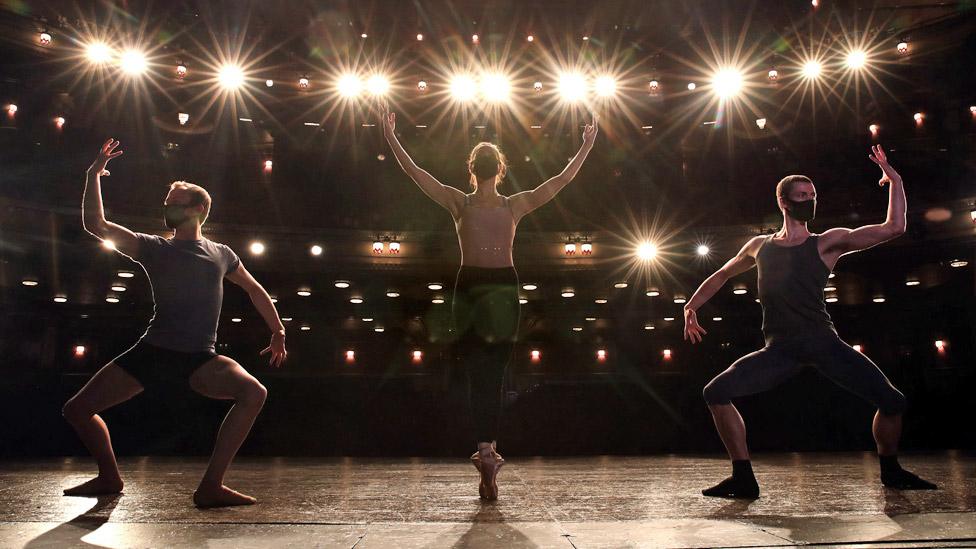
- Published11 December 2020
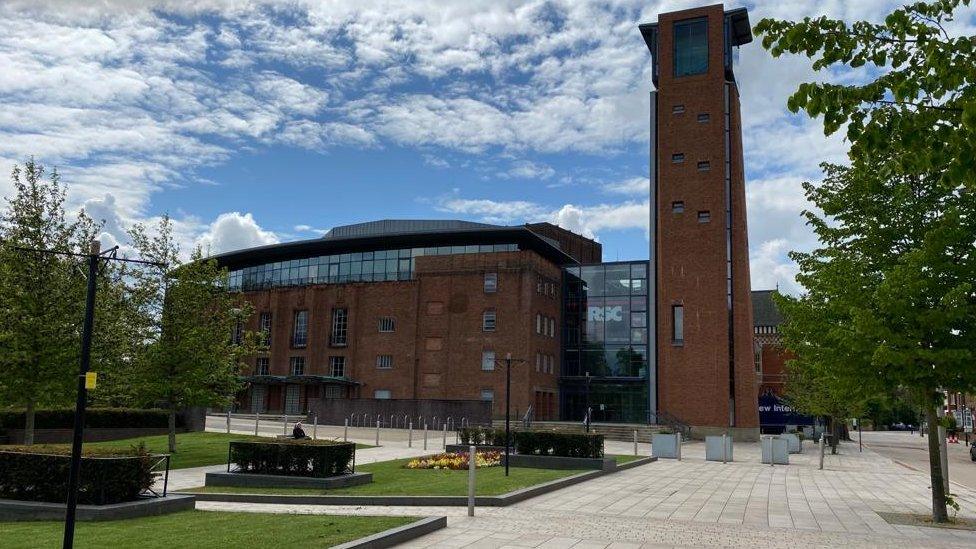
- Published29 November 2020

- Published5 November 2020
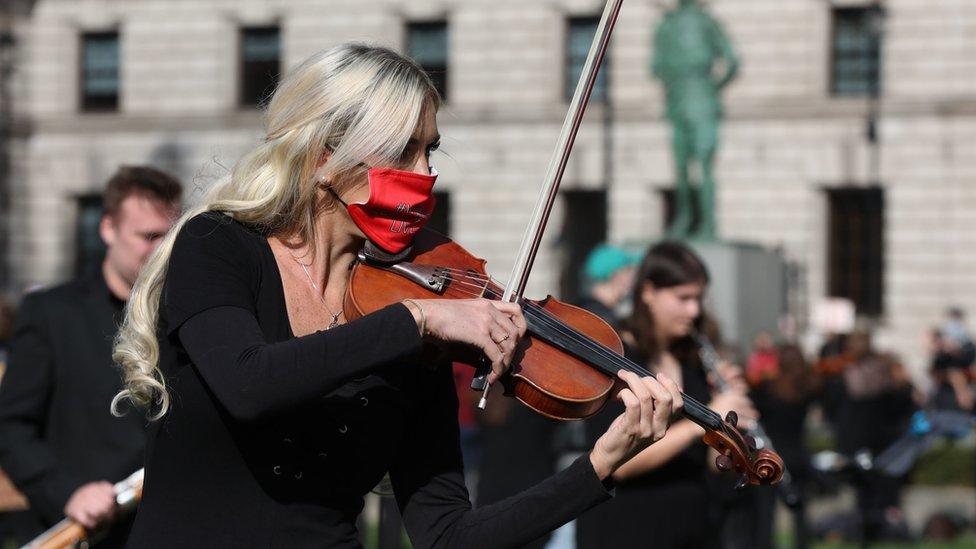
- Published3 July 2020
